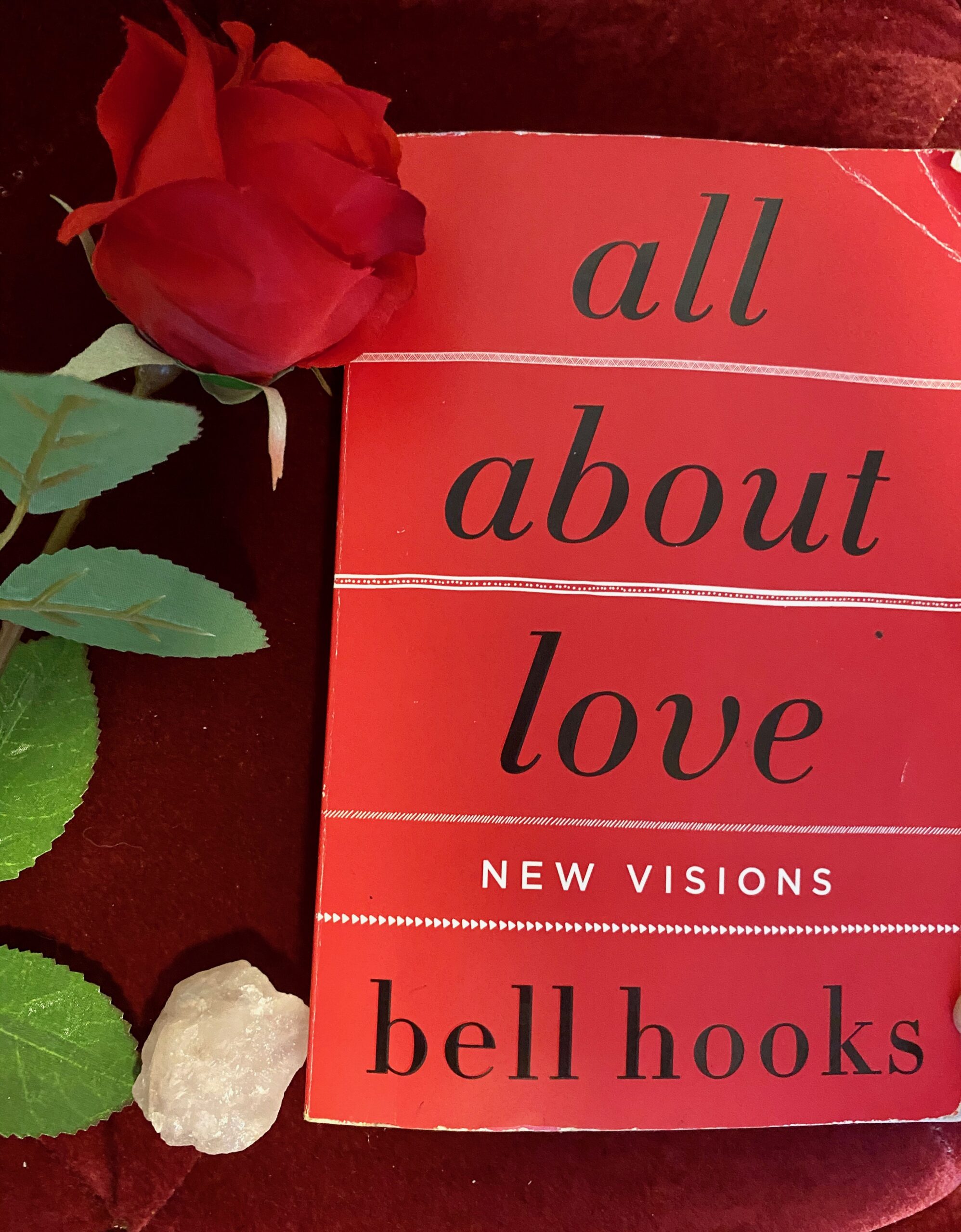bell hooks is a phenomenal cultural critic, writer and intellectual who covers topics across the spectrum of identity, including race, gender, spirituality, as well as media in contemporary culture.
Understanding “love” is so important to me. Maybe it’s the romantic in me, or the empath that loves love. I give love, sometimes unrequitedly but the hurt has never stopped me from holding affectionate space for others, even if it has to be from a distance.
Love is not a noun, and I believe it’s oftentimes thrown around too frivolously. I’m definitely a person that will respond to “I love you,” with “thank you,” if I know I don’t honorably hold that that same sentiment. That also means that I require reflection on why that response exists and how to get to a place to righteously love that person. Love is a verb, a state of being; it’s something I’ve actually sat down and have reflected on how to define it for myself. What does it look like? What actions give this word profound meaning? How do I use and embody it purposefully? How do I honor that word when it escapes my lips and falls on another’s ears?
It was inevitable that All About Love: New Visions made its way into my Amazon cart, and in my mailbox the next day. The paperback is just under $14. It is a fairly quick read – 237 pages – but it took me some time to finish because I was constantly pausing and pondering. It is broken down into thirteen chapters which are: Clarity: Give Love Words; Justice: Childhood Love Lessons; Honesty: Be True to Love; Commitment: Let Love Be Love in Me; Spirituality: Divine Love; Values: Living by a Love Ethnic; Greed: Simply Love; Community: Loving Communion; Mutuality: The Heart of Love; Romance: Sweet Love; Loss: Loving into Life and Death; Healing: Redemptive Love; and, Destiny: When Angels Speak of Love. Throughout the text, hooks incorporates and bounces her ideas off of the words of other notable authors such as: Deepak Chopra, Thomas Merton, Marianne Williamson, Thich Nhat Hanh and Toni Morrison. It provides a well-rounded critique of observations made about modern-day love.

Lessons on Love
We must heal the grief from not receiving or losing the love we desired long ago; to reconcile with the pessimism that genuine love does not exist, or that we are unworthy of receiving such a transformative action from another. Our heartbreak is the despair rooted in fear that love is not available to us in this world, in this lifetime; and, that is simply not true.
Love requires risk because it demands an overwhelming level of vulnerability – to give our Self completely to another through a significant emotional investment; to trust unquestioning in the purity of its intentions, despite its imperfections. Love is faith, commitment, care, respect, intuitive knowledge, emotional groundedness and responsibility. Much like any form of negativity, it is easier to revel in its pain and absence, than to find gratitude in the places and people that it does, in fact, endure within and brings meaning to our life.
Love is a constructive strategy of radical resistance – to live with a genuine expression of joy and spiritual health. It is a lifestyle of intentionality that cultivates healing of the Self so that we may build and maintain confidence (self-worth) and well-being. The way we love ourselves does not request that it is something we give or seek externally, but within and for our own upkeep. Our homes are places that should articulate self-love, and if others are invited inside, communal love. It is a space to give and receive love and every object should reflect that; that is why it is important to declutter and understand concepts such as Feng Shui.
hooks discussed skepticism around New Age spirituality and its “dangerous narcissism” of self; self-love, self-compassion, self-healing, etc. It excludes the importance of a balance of help, of community. Without that equilibrium, we may find ourselves battling feelings of inflicted loneliness and isolation, which is the opposite of being in communion with love. A commitment to soulful love means that we marry what we have cultivated inside of us with a willingness to enact that same unconditional act with others through our words and behavior, honoring the principles of interconnectedness. It is morally irresponsible to listen and/or commiserate without offering a beneficial way to confront the distress caused by a lack of loving engagement. To learn compassion, we have to be motivated and prepared to hear pain, and sit with another’s anguish without defense. “Love is the ability to hear honest, critical feedback” (pg. 134) because a good friend desires good, the best of us to be brought forth and will challenge the deceit of unanswered love within ourselves or interactions.
Love presupposes that there is an eagerness to change and dismantle the systems and barriers, internally and externally that prevent all from experiencing a life that is full and well. “Cultures of domination (supremacy) rely on and are upheld by the cultivation of fear” (p.93). This is why we have become obsessed with the notion of “safety.” Nothing evolves in a comfort zone; it remains stagnant as we fight for a sense of control, which then befalls a feeling that is ever-escaping from our grasp. Fear removes the ability to empathize and find our Self in another. When we think of supremacy and oppression, I find a difference in anger rooted in this fear versus anger established by repressed grief. Remember, anger is a surface emotion; and, therefore, is not necessarily substantiated in a universal reasoning. When we are hardened to the divinity of love, we turn our attention to material manifestations of love that seem more attainable. These “goals” give the perception that we are “safe,” even though these wants and needs promote a psychological state of endless craving; it is lustful, because these things will never be spiritually fulfilling, and we fall into a trap of greed.
The notion of falling in love is another trap – it absolves us of responsibility and choice. Love is a choice. Someone once told me, “I wake up every day and choose you,” and I didn’t fully believe it or comprehend what it meant – the journey that we are on together; but, I was – I am – still uncovering the complexity of love. It’s not something that just happens. Yes, various forms of attraction may be unprovoked, but to continuously act on it, through the good and the bad, is a conscious decision full of effort. To “fall in love,” in this book, was described as a mix of confusion, awe, fear and fascination. Thinking that love is something you have to seek and obtain through a partner, is fear-based. To believe you are not complete unless there is another suggests you cannot be whole without someone giving to you, rather than adding to the immense greatness you already have. Love is not a give and take, it is a balance. Ego/fear-based wants and desires are possessive – I want what I want, when I want it, how I want it. That is not love. Love is flowing; it doesn’t create blockades. A loving and non-attached perspective allows for things to come when it is meant for you, and to leave when it no longer serves you or the other person. Your desires are drawn to you when you are in alignment. Love does not force; it does not have to convince; it is magnetic. If we do not believe that we belong, we fear abandonment – who are we beyond the relationship with others? People come and go, live and die; we are temporary physical beings. You have to love and define yourself and not request someone else to do that for you – their truth may not be true to your spirit and that will cause internal conflict. We will then use the caricature of our masculine or feminine wiles to play a game of power to hold onto this thing we want or feel we need to have – this feeling of love and completion. Love is not through another, it is with them.
